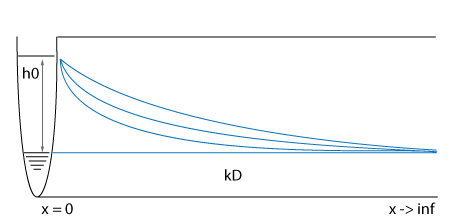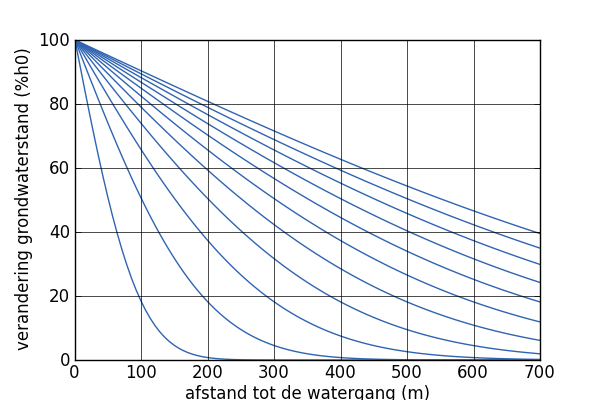Waterway level change benchmark (Water Module): Difference between revisions
(→Setup) |
(→Setup) |
||
| Line 30: | Line 30: | ||
===Setup=== | ===Setup=== | ||
The grid chosen is 51 by 7. The ground water table comparisons will be conducted in the x-direction. | |||
The terrain height is set up as followed: | |||
5 Inlets, each on one cell, each with: | 5 Inlets, each on one cell, each with: | ||
Revision as of 10:04, 11 December 2020
Initially, the ground water table is the same as the water level in the waterway. Suddenly the level in the waterway rises with h0 meters. This causes water to infiltrate into the ground, raising the ground water table.
Formulas
When the water level in the water way changes, the water table level will also change over time. The relation between water level in the waterway and the ground water table at distance x from the water way is described by the following formulas: In case teh water level is raised, the following formula should hold:
In case the water level is lowered, the following formula should hold:
The formula erf is the complementary error function.
where:
- : change in freatic groundwater table (m)
- : change in water level in the waterway(m)
- : distance to the water way (m)
- : time since the water level change
- : transmissivity of the aquifer (m2 / day)
- : freatic water storage fraction.
Setup
The grid chosen is 51 by 7. The ground water table comparisons will be conducted in the x-direction.
The terrain height is set up as followed:
5 Inlets, each on one cell, each with:
- UPPER_THRESHOLD set to X.
- LOWER_THRESHOLD set to X.
- Inlet Q set to 0, such that is unlimited.
This ensures that the water level is instantly raised to level X and that it remains at X at all times.
The ground is setup with: Water storage fraction set to .
An aquifer is added for the region as well, initialized with the Aquifer KD set to kD.












